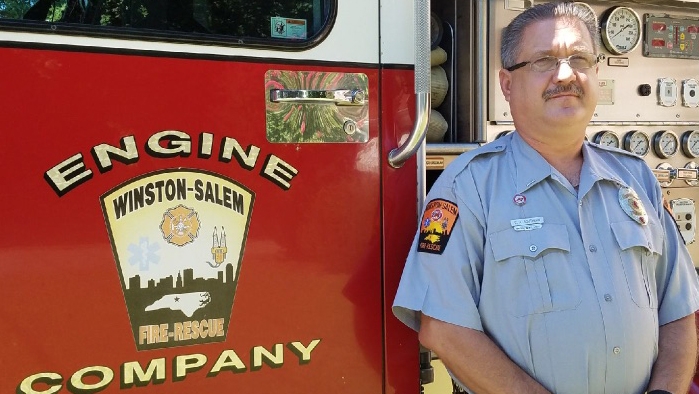Dale Southern has been a firefighter in Winston-Salem, North Carolina, for more than 23 years, and a volunteer for the nearby Clemmons fire department for 34 years. For the 54-year-old engineer, it’s his life.
In March 2016, Southern underwent the annual “fit-for-duty” physical required of first responders. “As the nurse was running the electrocardiogram (EKG), she asked me ‘Have you ever had heart problems?’ I said, ‘No,’” Southern recalled. The physician performing the tests next did a carotid test to check his arteries and told him he had atrial fibrillation (AFib) and needed to go to the hospital. “My heart rate was at 160,” Southern said.
Atrial fibrillation is a medical condition caused by a quivering or irregular heartbeat that can lead to blood clots, stroke, heart failure and other heart-related complications. The American Heart Association estimates at least 2.7 million Americans are living with AFib.
Southern said he couldn’t even tell that he had an irregular heartbeat.
In cases of AFib, the upper chambers of the heart beat irregularly instead of beating normally to move blood into the ventricles.
If a clot forms, breaks off, enters the bloodstream and lodges in an artery leading to the brain, it can cause a stroke. About 15 to 20 percent of people who have strokes have this irregular heart condition. Patients with this condition are usually treated with blood thinners.
At Novant Health Forsyth Medical Center, Southern was stabilized and given medication to reduce his heart rate. He was also put on blood thinners.
Following his hospitalization and recovery, Southern learned he couldn’t return to work as a firefighter while taking the blood thinners he had been prescribed to treat his AFib condition. National Fire Protection Association guidelines state that the medication compromises a firefighter’s ability to do his or her job because of increased risk of internal bleeding due to trauma.
Dr. Bryon Rubery with Novant Health Cardiology - Winston-Salem recommended a minimally invasive procedure to treat Southern’s AFib known as a catheter ablation . During an ablation, the physician will destroy tiny areas in the heart that are firing off abnormal electrical impulses that are causing the AFib. Southern underwent the procedure last July. “By September, I learned that I still had an irregular heartbeat,” Southern said. And he was still taking blood thinners so he couldn’t go back to work.
Rubery suggested a new treatment option available at Novant Health Forsyth Medical Center known as the Watchman device to treat the AFib. Approved by the Food and Drug Administration in 2015, this device can serve as an alternative to patients who are on a blood thinner regimen to treat AFib.
The umbrella-shaped device is implanted in the heart using a catheter. It is used to close off a part of the heart called the left atrial appendage, an area where more than 90 percent of blood clots originate. The thin, permeable filter of the device allows for the flow of blood but blocks clots from passing through, thus preventing a stroke.
“Without the Watchman, he would have to take an anticoagulant (or blood thinner) to avoid stroke. But he couldn't take an anticoagulant and still work as a firefighter,” Rubery said.
Southern decided to undergo the surgery. Last December, he had the procedure and was home the next day.
A follow-up exam the next month showed the device was working as expected and he was taken off blood thinners. In February, Southern underwent a provisional physical for the fire department where he was given a clean bill of health. He returned to work in March.
Southern said the Watchman procedure was critically important to him. “It gave me the freedom to go back to work and finish the last six years in order to receive full retirement benefits.”
“I still have an occasional fluttering of the heart, but I’m less likely to have a stroke now. And I can physically go and do anything I want,” he said.




